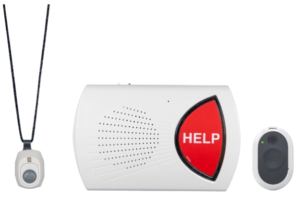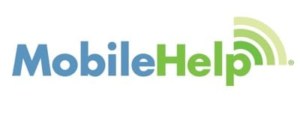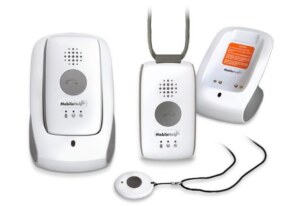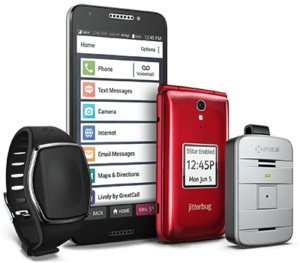What Are The Most Affordable Medical Alert Systems?
AgingInPlace.org keeps our resources free by working as an affiliate partner with some companies mentioned on our site. These partnerships or the commission we may earn do not affect our opinions or evaluations of the products we mention. Our reviews are solely based on our research methodology and from input from our AgingInPlace.org Advisory Board. Learn more about our ad policies.
What Are The Most Affordable Medical Alert S...
Products carousel
Many seniors live on a fixed income. As a result, they are usually looking for a good deal on whatever they purchase, including medical alert systems. For this reason, the most affordable medical alert system will no doubt seem like the best. However, since seniors are more at risk for health emergencies and falls, a good medical alert system can be lifesaving, and that is priceless.
Most people are still looking for something reasonably affordable, and that can depend on several things. A majority of alert systems have a monthly fee for their services, the specific amount of which depends on what services are included with the system. Add-on features can increase the monthly fee, or they can be a one-time charge. Whether the medical alert works only at home or can be used outside of it is a big factor in pricing as well.

Anyone looking for the most affordable medical alert system will be trying to make sure that their monthly bill is straightforward, with no hidden fees creeping in. Here’s how affordable some of the best medical alert systems are.
Key Takeaways
- Many medical alert systems are expensive, but there are several that cost much less than their counterparts.
- You can find affordable medical alert systems that are in-house or on-the-go.
- Insurance plans often do not cover medical alert systems, but there are different ways to get a discount.
Most Affordable Medical Alert Systems

Having success in finding the best deal for a medical alert system depends on several different things. A senior who spends most of their time at home and is only worried about fall detection can probably find a system that costs less. However, if you or your loved one are looking for a medical alert system outfitted with connected wellness apps and monitoring systems that works wherever you go, it will cost more overall. In general, at-home medical alert systems are less expensive than on-the-go medical alert devices. Monitoring more than one person also adds to the price and having wearable pendants instead of—or in addition to—a wall button will also cost more. Various add-ons are offered for many medical care alert systems that will also drive up the price.
Pros
-
Lowest monthly fees
-
At-home plans have no equipment fees
-
Free shipping
Cons
-
Fewer product offerings than other plans
-
Least expensive plans require a landline to work
If you’re looking for the most affordable medical alert system overall, Bay Alarm Medical is hard to beat. Whether it’s an at-home system, an on-the-go medical alert system, or a bundle package that combines both systems, opting for a system from Bay Alarm Medical will cost you no more than $40 a month. The at-home systems have no activation or equipment fees, and all of the systems feature free spousal monitoring (although you do have to pay for the extra pendant). Most importantly, Bay Alarm Medical gives you a price lock when you order, which means that even if the fee goes up later on, you’ll never be charged more than the price you signed up at. If you’re not sure whether this is the right system for you, the company also offers a 30-day free trial.
The In-Home Medical Alert system is $24.95 per month for the landline option, or $29.95 per month for the cellular option. This includes a base station and a wearable alert pendant or wristband. The range is 1,000 feet from the base. The base station can also be used as a speakerphone if the user is within hearing distance.
The On-The-Go Medical Alert system is $29.95 per month. This includes a handheld device with an alert button that connects to a call center by cellular connection.
The SOS Smartwatch system is $29.95 per month. Bundled Systems are $39.95 per month. Any plan can include fall detection for an extra $10 a month. Extra pendants and wristbands can be ordered for $35 each. Additional wall buttons can be ordered in packs of two ($5 per month) and four ($10 per month). Only mobile plans have device fees, which can range anywhere from $99-$179.
See our full Bay Alarm Medical Review.
Pros
-
30-day free trial
-
No contract required
-
Several options for couples
-
Discounts through referral program
Cons
-
Fall detection costs extra (an added fee per month)
-
Some plans have equipment fees
MobileHelp is one of the best affordable medical alert systems for those who spend most of their time at home. The company offers three different at-home medical alert system packages, two on-the-go systems, and two hybrid systems. Two of the three at-home packages are low in cost, starting at $19.95, and offer access to the MobileHelp online portal. If you choose to pay on a quarterly, annual, or semi-annual basis, MobileHelp will offer discounts on your monthly fees, as well as free shipping on any devices. MobileHelp also offers a free 30-day trial for all its products.
The Classic system is the base MobileHelp system for at-home use. It’s a cellular-based system, so it doesn’t require a landline. It comes with a speakerphone base with a test button and a waterproof help button. The monthly fee is $19.95, with an optional fall detection feature for an additional $10 a month.
The Wired system requires a landline to use. It costs $24.95 a month, which includes a base station with two-way communication and a waterproof help button. The third at-home system is the unique MobileHelp Touch Classic. Instead of a standard base, it consists of a tablet device with a help button, caregiver tracking, and various games to help keep you mentally sharp. It’s the most expensive by far at $54.95 per month, and it has a processing fee of $99.95. The MobileHelp Solo comes with a base device and a GPS-enabled pendant button. It costs $37.95 a month, with an optional fall detection feature for an extra $10 a month.
MobileHelp Micro is a tiny button pendant (it weighs less than a tenth of a pound) with GPS and automatic fall detection. It is $33.95 a month. The MobileHelp Duo and MobileHelp Mobile Duo are identical systems, but the Mobile Duo includes two help buttons instead of one. Both also include an in-home unit and a mobile unit. The Duo is $41.95 per month, and the Mobile Duo is $44.95 per month.
See our full MobileHelp Medical Alert System Review.
Pros
-
Caregiver app available
-
Offers cell phone plans as well as medical alert systems
-
Discounts available through referral program
Cons
-
Activation fees can be costly
-
Fall detection only available on most expensive plan
Lively, formerly known as GreatCall Lively Mobile, specializes in cell phones and mobile devices that can be used as medical alert systems. Unlike many of the other companies on the market today, Lively does not have any at-home devices at all. Instead, all of its systems are designed to be used on the go.
Lively offers two different medical alert systems. The Lively Mobile Plus is a button that functions as a two-way speaker and can be worn as a pendant or on a belt clip. The Lively Wearable2 is a smartwatch that connects to the Lively app on any smartphone. Lively also offers cell phones that are specifically designed for seniors and those who have limited mobility in their hands. When you purchase one of these phones, you’re given the opportunity to enroll in one of the company’s medical alert system plans. A smartphone option is available, as well as a traditional flip phone.
The Lively Mobile Plus is $49.99 to purchase plus a $35 activation fee. The Lively Wearable2 is also $49.99 to purchase plus a $35 activation fee. Both can be enrolled in any of the three available packages. The Basic package is $24.99 a month and only covers alert notifications. The Preferred package is $29.99 a month and includes alerts, the Lively Link app, and a feature where you or your loved one may ask a doctor or nurse health questions at any time. The Ultimate package is $39.99 a month and contains everything in the Preferred package, as well as automatic fall detection.
Lively is running a promotion for its cell phone systems as of writing. The Jitterbug Smart3 is normally $149.99, it’s discounted at $112.49. The Jitterbug Flip2 can be bought for $79.99 right now (normally $99.99). The cell phone plan you choose can range from $14.99-$49.99 monthly. The Basic package for both is $19.99 monthly, the Preferred is $24.99 monthly, and the Ultimate package is $34.99 monthly.
See our full Lively Medical Alert System Review.
Less Affordable Medical Alert Systems
If cost is not a concern for you, there are several other best personal emergency response systems available.
- Medical Guardian: This system offers two different home-based systems and three on-the-go alert systems. The company offers a variety of add-ons and TMA Five Diamond–certified monitoring centers.
- Aloe Care Health: This system has a voice-activated base that can monitor motion, air quality, and temperature through a related app. Emergency services can be summoned by the same voice activation.
- HandsFreeHealth: This system is a Bluetooth-based smartwatch that can answer health questions, detect falls, monitor various vital signs and offer appointment and medication reminders.
- GetSafe: GetSafe offers a medical alert system that doesn’t need to be worn in order to be used. It includes a voice-activated base with a good range and an optional wearable button.
- Medical Care Alert: Medical Care Alert is known for its excellent customer service. The company’s monitoring centers are staffed with EMT-trained individuals who have undergone six weeks of additional training.
How to Choose the Most Affordable Medical Alert System
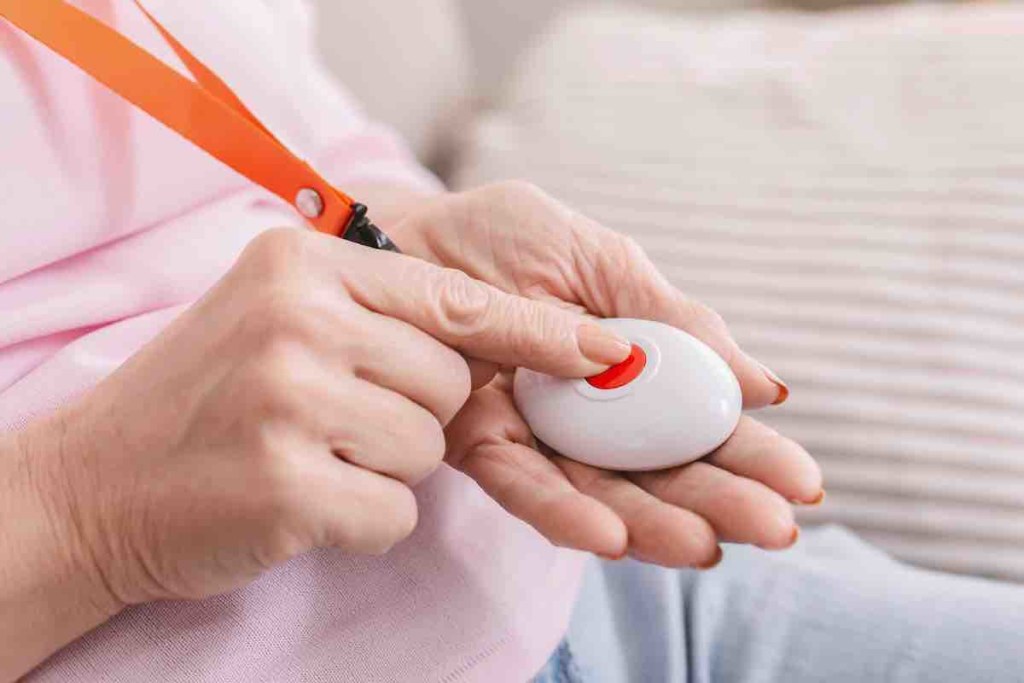
If you’re looking for the most affordable medical alert system, you should first decide what you specifically want and need from a system. Here are some questions to ask before you select one:
- Do you want an at-home system or one that will work on-the-go?
- If you want an at-home system, do you have a landline?
- Do you need fall detection?
- Do you want medication reminders or location tracking?
If you’re content with in-home monitoring only, you can often save more money, especially with landline options. If you need fall detection, this will usually cost more. Smart or connected devices are among the most expensive.
More Options for Inexpensive or Free Medical Alert Systems
The best medical alert systems with fall detection may seem like something insurance would cover. Unfortunately, medical alert systems are not covered by Medicare. Despite their usefulness in senior living, they’re not considered to be an “approved medical device.” While a few private insurance plans will cover medical alert systems, most do not. If you’re having trouble affording a medical alert system, there are still several options for discounts.
- Some systems offer discounts to members of particular senior groups. Bay Alarm Medical, for example, offers monthly fee discounts to both AARP and USAA members. Lively also offers a discount to AARP members.
- If you have coverage through Medicare Part C, you may be able to fund some of a medical alert system through that.
- If you’re eligible for Medicaid, some medical alert systems are covered as “Personal Emergency Response Services.”
- If you’re a veteran, there are two different systems covered by the VA: LiveLife Mobile Alarm and MedEquip Alert. LiveLife is not monitored 24/7, while MedEquip Alert is. Both offer only a simple medical alert system.
- Long-term care insurance plans will often cover part or most of a medical alert system.
- Local organizations that help seniors may have resources to help cover a system.
Bottom Line
If you need a medical alert system, there are several affordable options, especially if you’re willing to use a system with fewer features. Even if you want a system that offers more features and does more outside the home, there are still ways to reduce the monthly cost.
Why You Can Trust Our Review
Our AgingInPlace.org medical alert experts independently research and recommend products we believe provide value to the lives of our readers. We’ve collectively spent more than 1,700 hours conducting in-depth research on medical alert systems. Throughout this process, we:
- Engaged in ongoing independent research
- Consulted with geriatricians and adult caregivers
- Mystery shopped the brands
- Surveyed medical alert system users
- Tested various medical alert systems
Frequently Asked Questions
-
There are several medical alert systems that cost $20 a month or less. Some offer discounts when you pay on a quarterly or annual basis.
-
Medicare does not pay for alert devices, because the devices are not an approved medical device.
-
Seniors are more at risk from falls and other medical emergencies. For this reason, the protection a medical alert system offers can be considered well worth the cost.
-
The AARP does not cover medical alert systems, but it does offer discounts on some of the available products associated with the systems.
-
Medicare does not pay for lifeline.
Pricing is accurate as of March 15, 2022.
WRITTEN BY
Annie Keller is a freelance medical writer in Lowell, Mass. She has worked for a variety of medical publications and organizations. She has written about chronic illness, medical technology and devices, medical issues in the news, skin treatments, sports medicine, and many different conditions.
View AuthorDo you want to cite this page? Use our ready-made cite template.

